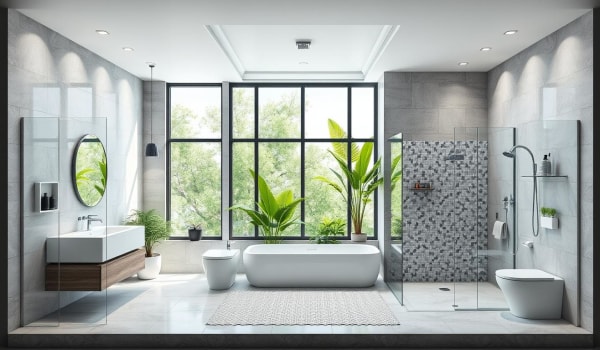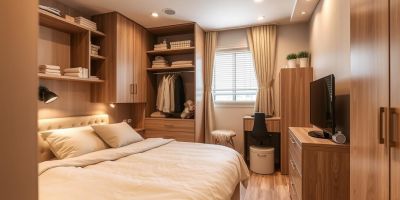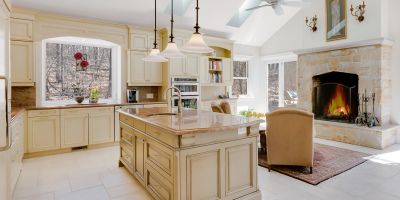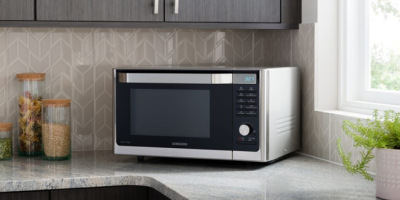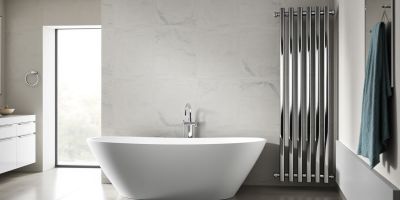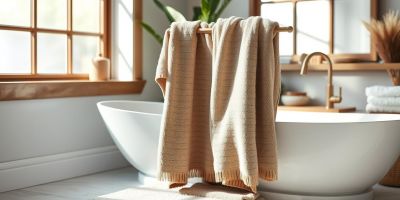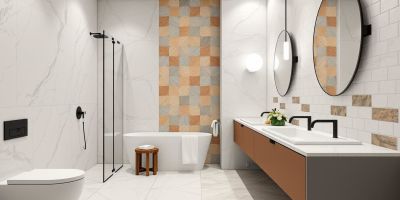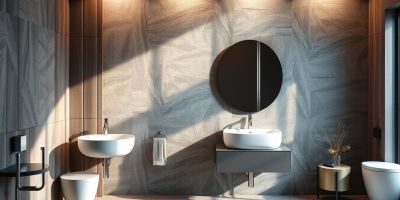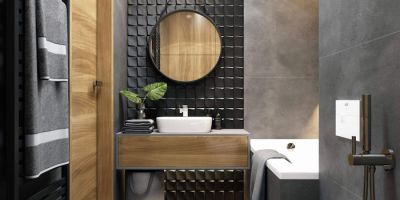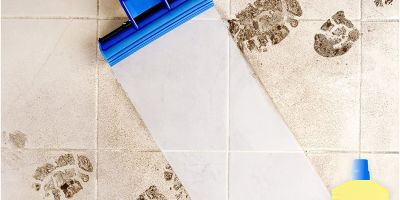2024-10-21 16:31:18 |
Are you ready to make your bathroom stylish? A shower cubicle could be the answer. These sleek enclosures mix function and design, making them a hit in UK homes.
Shower enclosures come in many styles and sizes. They fit all budgets and spaces. You can find everything from small quadrant designs to big walk-in options.
When picking a shower cubicle, think about glass thickness, door type, and tray options. Top-quality enclosures use 8mm or 10mm safety glass. This makes them durable and safe. Many also have easy-clean coatings for simple upkeep.
For a luxurious touch, look for shower cabins with body jets, lights, and steam functions. These high-end models can fit two people, turning your bathroom into a home spa.
Key Takeaways
- Shower cubicles enhance bathroom design and functionality
- Various styles available to suit different space requirements
- Premium options feature thicker safety glass and easy-clean coatings
- Quadrant designs are ideal for smaller bathrooms
- Luxury shower cabins offer additional features for a spa-like experience
Understanding Shower Enclosures: A Comprehensive Guide
A shower enclosure makes your bathroom stylish and practical. It keeps your bathroom dry and adds elegance. Let's dive into the world of shower enclosures and see why they're loved in modern homes.
What is a shower enclosure?
A shower enclosure is a glass box around your shower. It has glass panels and a door that slides, pivots, or folds. Some have a walk-in design for easy entry. They come in many shapes and sizes to fit any bathroom.
Benefits of installing a shower enclosure
Installing a shower enclosure brings many benefits:
- Enhanced safety by containing water splashes
- Improved bathroom aesthetics
- Minimal maintenance requirements
- Resistance to water and soap stains
- Added value to your property
Framed vs frameless shower enclosures
Framed shower enclosures have metal frames around the glass. They're affordable, costing between £161 and £1,350. Frameless enclosures use thick glass (at least 9.5mm) without frames. They look sleek but cost more, from £327 to £1,978.
Assessing Your Bathroom Space: Key Considerations
Start by checking your bathroom's size and layout. This will help you pick the right shower stall. Measure the area carefully, including the height, for a perfect fit.
In small bathrooms, a quadrant-shaped cubicle is a good choice. These are between 70 and 90 cm on each side. For bigger spaces, consider rectangular enclosures from 100 x 80 cm to 180 x 90 cm.
Think about what your bathroom is for. Is it for the whole family, an ensuite, or a wet room? This will help you decide on the right shower enclosure. For example, a wet room can make a small area feel bigger.
Also, consider where your plumbing is. Try to match the new shower's position with the old one to save money. For small areas, pivot or folding doors can be great space savers.
- Measure available space and height carefully
- Consider the bathroom's purpose
- Take note of existing plumbing
- Think about door types for tight spaces
The shape of your bathroom affects where and what type of enclosure you need. By carefully looking at your bathroom space, you'll find the perfect shower cubicle for you.

Types of Shower Cubicles: Finding Your Ideal Match
Choosing the right shower cubicle can change your bathroom experience. Let's look at different types to find the best one for your space and needs.
Quadrant Corner Shower Enclosures
Quadrant corner shower enclosures are a hit in UK bathrooms. They fit well into corners, saving space. They usually measure 800mm x 800mm x 1850mm, perfect for smaller bathrooms. For bigger rooms, you can find 1000mm x 1000mm options.
Rectangular and Square Shower Enclosures
Rectangular shower enclosures offer a lot of room. They're 1000mm x 700mm x 1850mm, great for larger bathrooms. Square enclosures, fitting into corners, are ideal for en-suites or guest bathrooms. They range from 700mm to 1700mm wide.
Walk-in Shower Enclosures
Walk-in shower enclosures give a spacious, open feel. They come in sizes like 900mm x 900mm and 1200mm x 1200mm. These cubicles offer a luxurious bathing experience, perfect for a modern look.
Pentagonal Shower Enclosures
Pentagonal shower enclosures have five sides with a straight door entry. They're great for irregularly shaped bathrooms. These unique cubicles mix style with function, making the most of corner spaces.
When picking your shower enclosure, think about your bathroom's size, layout, and what you like. Remember, shower cubicles vary in glass thickness, from 4mm to 10mm. 8mm or 10mm glass is more durable and easy to clean.
Shower Cubicle Doors: Exploring Your Options
Choosing the right cubicle doors for your shower can make a big difference. It affects both how well it works and its look. There are many types of shower screens, each with its own benefits.
Hinged doors open wide, great for big bathrooms. They swing out, making it easy to get in. Sliding doors are better for small spaces. They slide along tracks, perfect for bigger showers.
Pivot doors have two pivot points for a tight fit. They can open in or out, giving you options. In-swing doors are good for small bathrooms. They open in, saving space outside.
Bi-fold doors are great for long or rectangular showers. They fold in, saving space while still letting you get in easily. Some makers have multi-panel folding screens. One panel stays still while others fold on hinges.
- Hinged doors: Wide opening, require space
- Sliding doors: Space-saving, smooth operation
- Pivot doors: Flexible opening, secure fit
- In-swing doors: Ideal for small spaces
- Bi-fold doors: Perfect for rectangular showers
When picking shower cubicle doors, think about your bathroom's size, layout, and what you like. With so many options, you'll find the perfect fit for your shower.
Glass Thickness and Types: Ensuring Quality and Safety
Choosing the right glass for your shower cubicle is key for safety and looks. The thickness of the glass affects both its durability and how it looks.
Tempered Glass Options
Tempered glass is the top pick for shower screens because it's strong and safe. You can find it in different thicknesses:
- 6mm: A standard choice, it's light yet durable.
- 8mm: Great for areas that get a lot of use.
- 10mm: Best for wet rooms and walk-in showers.
Thicker glass is seen as more luxurious and of higher quality. For frameless glass cubicles, 10mm is the best choice for its strength and looks.
Easy-clean Coatings
Today's shower screens often have easy-clean coatings. These coatings keep water, dirt, and limescale away, making cleaning easy. They're especially good for areas with hard water.
Mirrored Shower Doors
Shower Trays: The Foundation of Your Enclosure
Shower trays are the base of your shower cubicle, blending practicality with style. Prices range from £85 to £387, fitting all budgets. They come in shapes like rectangular, square, quadrant, and pentagonal, meeting various needs and tastes.
Choosing a shower tray involves considering the material. Stone resin trays are durable and slip-resistant. Acrylic trays keep heat well, making showers warm. ABS trays are strong and easy to clean.
Size is crucial for shower trays. With 25 options, you'll find the right size for your bathroom. Square trays are trendy, while rectangular ones offer more space. Quadrant trays are great for corners, saving space in small bathrooms.
- Consider heat retention and slip resistance
- Choose a material that's easy to clean
- Ensure the tray size fits your shower cubicle perfectly
- Look for trays with high walls to prevent water spillage
Your shower tray is not just functional; it's a design element. With 1,531 products and delivery or click and collect options, finding the perfect tray is easy.
Wall Protection: Tiles vs Shower Wall Panels
Protecting your bathroom walls from water splashes can be done in two ways: with ceramic tiles or shower wall panels. Both options have their own benefits for your wet room or shower area.
Shower wall panels are becoming more popular. They are cheaper and quicker to install, taking only a third of the time of tiling. Panels usually come in sizes from 2m to 2.5m high and 0.6m to 1.2m wide. Some makers even offer custom sizes.
Wall panels are also low maintenance. They don't have grout lines, so they stop mould from growing. They're ready to use in 24 hours and some have a 30-year guarantee, showing they last long.
- Over 90 different finishes available
- Panels up to 3 meters long
- Antibacterial and antimicrobial protective coatings
Tiles, however, give a classic look and are durable. But, they can be expensive, costing hundreds per square metre. Tiles need regular cleaning to keep them looking good, especially in wet areas.
For a wet room, sealing is key, no matter your choice. Wall panels offer better waterproofing without extra tanking. Your decision will depend on your budget, how much upkeep you want, and the look you want for your bathroom.
Space-Saving Solutions for Small Bathrooms
Small bathrooms don't have to lack style or function. Clever design can make even the smallest spaces feel larger. Let's look at some smart ways to save space in your bathroom cubicle.
Bi-fold Shower Enclosures
Bi-fold shower enclosures are great for narrow bathrooms. They split in two and slide to one side, freeing up floor space. The Radiant 700mm Three-Sided Shower Cubicle Bifold Door is a good choice. It has clear shield anti-limescale protection, making it easy to keep clean.
Compact Quadrant Designs
Quadrant shower cubicles curve around corners, saving space. The Radiant Deluxe 900mm Quadrant Corner Shower Enclosure offers a big shower area despite its small size. It also comes with a lifetime guarantee, adding to its value.
Reduced Height Options
For bathrooms with low ceilings or under staircases, reduced height shower enclosures are perfect. The Radiant 700mm Reduced Height Pivot Shower Door is a great option. It offers a stylish solution without sacrificing practicality.
The smallest shower cubicle is 700mm x 700mm. When planning your bathroom, make sure there's at least 24 inches of space in front of the shower door. With these space-saving ideas, you can turn your small bathroom into a stylish and functional space.
Luxury Features for Large Bathrooms
Large bathrooms are perfect for creating a luxurious shower experience. With plenty of space, you can turn your shower into a spa. Since COVID-19, people want spacious shower enclosures more than ever.
For a luxury shower, size matters. High-end enclosures are often 1700mm or 1800mm wide. This gives room for features like ceiling showers and digital valves, found in 60% of luxury setups.
Luxury showers also focus on smart colours and top materials. Over 80% have striking colours and 70% use durable materials like brass and chrome. Glass is 8mm to 10mm thick, adding safety and style.
- Customised designs for personalised retreats
- Mood-enhancing lighting in 70% of luxury showers
- Wall-mounted baskets and shelves in 65% of high-end enclosures
- Glass dividers and mirrors for effective space usage
Wet room-style layouts offer a seamless, open feel. These designs, up to 2000mm, make your bathroom feel like a spa.
Luxury showers might seem pricey, but discounts can help. You can save up to £668 on certain models. Financing starts at £87.5 a month, making your dream shower more affordable.

Budget Considerations: Shower Cubicle Pricing Guide
When you're planning to renovate your bathroom, knowing the costs of shower cubicles and fixtures is key. Prices for shower enclosures vary a lot. This depends on the style, materials, and features you pick.
Basic shower cubicles start at about £300. Adding installation labour costs another £200 to £250. If you're redoing your whole bathroom to add a new shower, expect to spend £3,080 to £4,600 for installation.
The total cost for installing a shower enclosure can be from £300 to £4,500. This depends on the type, materials, and labour needed. Here's a look at some typical costs:
- Shower pan: £250 to £600
- Ceramic tile: £1.5 to £2.5 per square foot
- Ceramic tile flooring installation: £8 to £16 per square foot
- Plumber rates: £30 to £50 per hour
- Carpenter rates: £50 to £60 per hour
Glass shower enclosures can cost between £300 and £2,000. This depends on size, thickness, and quality. Tiling a shower enclosure usually costs £800 to £2,000. To cut costs, try negotiating with bathroom fitters or retailers for discounts of about 10% on total prices.
Remember, hiring a licensed plumber for shower cubicle installation can save you money in the long run. Their skills help finish the job quickly and efficiently, which can lower overall costs.
Installation Tips: Ensuring a Perfect Fit
Installing a shower cubicle can be a fun DIY project. With the right planning and focus, you can get a professional look. Here are some key tips to make sure your shower fits perfectly.
Measuring Your Space Accurately
Getting your measurements right is key for a good fit. 82% of people make sure their measurements are accurate. Take several measurements of your bathroom, including any obstacles or uneven areas. This is the first step to a stable and fitting shower cubicle.
Considering Plumbing Requirements
Check your plumbing before you start. Showers that work with gravity-fed systems have more options. If you have a combination boiler or mains water, you might only have mixer or electric showers. Think about water pressure and temperature to pick the best shower for your bathroom.
Professional vs DIY Installation
87% of DIY fans think installing a shower cubicle is doable. But, be honest about your skills. Professional installers handle tricky tasks like waterproofing and electrical work. If you're sure you can do it, use a detailed guide and the right tools.
DIY installation usually takes 4 to 8 hours, depending on the job. Always put safety first and follow the rules, especially for electrical work. Good ventilation is also important to avoid dampness. With careful planning and doing, you can install a shower cubicle that makes your bathroom look and work better.
Conclusion
Choosing the right shower cubicle is key for your bathroom design. You have many options, from small quadrant enclosures to big walk-in ones. Frameless shower enclosures are also popular, adding elegance and making rooms look bigger.
It's important to measure your bathroom well before picking a shower. This helps avoid it feeling too small. Think about the shape, size, and door style that fits your space and how you use it. Enclosed showers keep water in, saving water and keeping things clean.
Deciding between a custom or modular shower depends on what you like and your budget. Talking to a bathroom expert can help you pick the perfect shower for your space. This way, you get a bathroom that's both functional and stylish.
FAQ
What is a shower enclosure?
A shower enclosure is a dedicated shower area with glass panels and doors. It creates a clear boundary, adds style, and comes in framed or frameless designs.
What are the benefits of installing a shower enclosure?
Shower enclosures add safety, make cleaning easy, and improve hygiene. They also enhance bathroom style, save space, and make rooms look bigger.
What's the difference between framed and frameless shower enclosures?
Framed enclosures have metal frames around the whole structure. Frameless ones use thick glass without metal frames.
What are the different types of shower cubicles?
Main types include quadrant corner, rectangular, square, walk-in, pentagonal, 3-sided, and bi-fold shower enclosures.
What are the different styles of shower cubicle doors?
Styles include hinged, sliding, pivot, in-swing, and bi-fold doors. Each fits different bathroom layouts and space needs.
What glass thickness options are available for shower enclosures?
Glass thickness options are 4mm, 6mm, 8mm, and 10mm. Thicker glass is more durable and easier to clean.
What are some glass types and features to consider?
Popular options include toughened safety glass, protected glass, easy-clean coatings, and mirrored doors.
What are the different options for shower trays?
Stone resin trays are durable and long-lasting. Some enclosures come with matching trays for a perfect fit.
What are the wall protection options for shower enclosures?
Ceramic tiles and shower wall panels are common. Wall panels are cost-effective, easy to install, and need less maintenance.
What are some space-saving solutions for small bathrooms?
Options include quadrant corner, bi-fold, and reduced height shower enclosures. They save space while keeping functionality.
What luxury features are available for large bathrooms?
Large walk-in enclosures, shower cabins with body jets, towel rails, and steam cabins with aromatherapy and chromotherapy lighting are popular luxury options.

